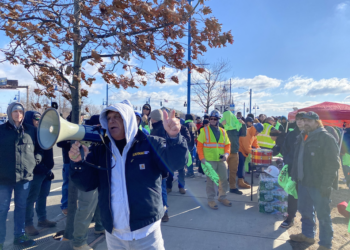Since the shutdown in mid-March, there are many more questions than answers about the future of the office.

One key trend has been seen in suburban markets as well as in New York City. While offices are technically open at significantly reduced capacity, employees are in no hurry to come back to them. Much of the issue in New York City is that employees do not want to use public transportation (Metro-North and/or the NYC subway system) to get to work. They consider these to be significant health risks.
Even in Westchester, where people drive to work, park their own cars and can usually walk up a few flights of stairs to their workplace, office attendance is extremely light.
Early in the pandemic, companies were talking about reopening their offices in July or September. Now the talk is January the earliest, with some not even setting dates and offering employees open-ended opportunities to continue working from home.
I personally feel that it is unlikely that office attendance in the suburbs will return to normal until mid-2021. Even if a vaccine is approved and available, there are still big questions about who will be willing to take it, and the public”™s confidence in its safety and efficacy.
Many large companies are anxious to get their employees back into the office, but they are being very careful not to mandate attendance for any employee who has safety and health concerns. There has been a small recent groundswell of New York City landlords and large companies that are now campaigning to reopen the city”™s offices and economy. While office-based businesses are generally functioning, many of the retail and service businesses that depend on workers for their livelihood are not functioning at all and are in danger of closing.
Employees are certainly used to “work from home” by now, and most of the people I have spoken to assert it is working well. However, there is little social interaction among workers and little opportunity to personally brainstorm about issues and problems.
In addition, new and younger workers are not being mentored by their seniors; they are not meeting their peers; they are not learning to interact with clients and customers on a face-to-face basis. All of these will impact negatively on their skills and career and development.
I believe that working from home will last in some form for the foreseeable future. If employees work even one day per week from home, that will mean that there are 20 percent fewer people in the office each day. This will decrease density and physical contact with others. While some companies have installed some after-market Plexiglas protection to better isolate workers to avoid airborne contamination, I do not know of any company that has entered into any physical reconfiguration of its office to address Covid-related issues. It is irrelevant anyway, as there are few people in the offices and few, if any, indoor meetings with fellow employees or clients.
Early on, there were many companies asking for surveys of available spaces for potential satellite offices in Westchester. My instinct tells me that they were covering themselves in the event they were asked if they had investigated suburban alternatives, so these surveys by and large went into the file drawer.
There have been some (relatively small) lease transactions of small accounting and other firms that have taken “as is” space in Westchester, but nothing of any significance. Some office leasing deals are taking place, as there are businesses that are stable and predictable and have upcoming real estate needs.
Others who are less sure of the near term future, are asking their landlords for 12- to 24-month lease extensions, just to give them some breathing room if their lease is expiring and they do not see a clear path forward.
Needless to say, landlords by and large are complying with these requests, as they need to pay their mortgages, taxes and operating expenses and are not seeing much general deal velocity to refill vacant spaces.
The Payroll Protection Program money was secured and largely spent on payroll and rent relatively early in the pandemic and has likely run out for many of its recipients.
By and large, the companies that I have spoken to are doing relatively well in their businesses. While revenue is generally down, it is not catastrophic, save for certain sectors like child day care, gyms, movie theaters and restaurants, whose businesses have been significantly damaged from the pandemic. Many of these will likely not recover, and the impact on the retail, fitness and entertainment sectors will be long-lived and/or permanent.
The jury is still out on the long-term effects of the pandemic on the office markets. This uncertainly will likely continue well into 2021, or more than a year since the original shutdown began.
The questions about the long-term future of work and offices will remain, and the answers will come slowly and in bits and pieces. The “new normal” will evolve very gradually, and the future of many large segments of the economy will depend on this evolution.
Howard E. Greenberg is president of Howard Properties Ltd. He has represented tenants and landlords for 34 years in Westchester County, throughout the United States and in Europe. He can be reached at 914-997-0300 or howard@howprop.com.


















